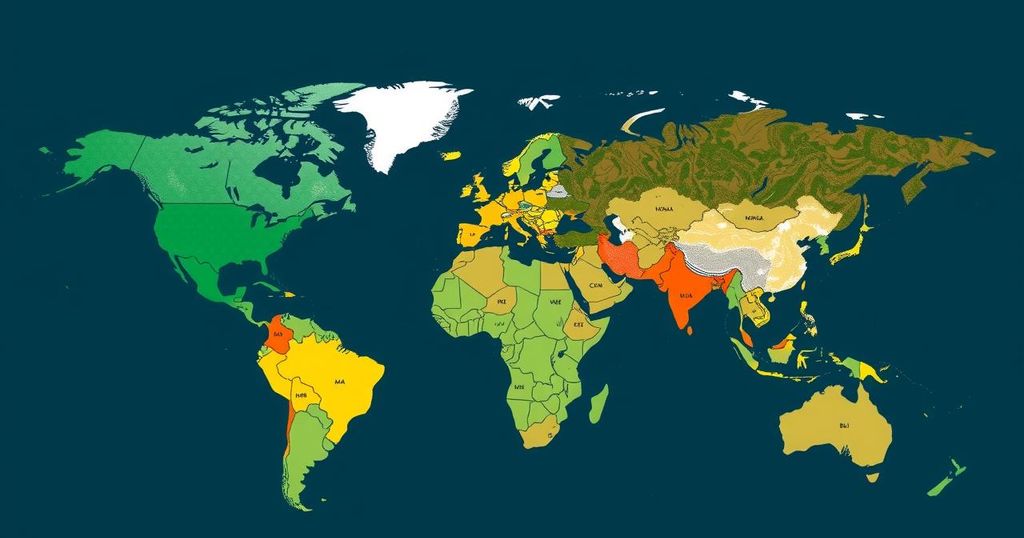Wealthy Nations Begin Compensating Developing Countries for Climate Damages

Richer nations are beginning to financially compensate poorer countries for climate change damages, exemplified by Malawi’s response to Cyclone Freddy. Over $720 million has been pledged for loss and damage funding as global discussions continue. As extreme weather events escalate, experts warn that current pledges will not suffice to meet the rising financial needs of impacted communities, calling for greater responsibility from industrialized nations.
As the impact of climate change intensifies, wealthier nations have begun compensating poorer countries for damage caused by climate-related disasters. Cyclone Freddy devastated southern Malawi in March 2023, resulting in significant displacement and destruction. Many families like that of Christopher Bingala, a subsistence farmer who lost his home, received financial assistance of approximately $750 to help rebuild. This assistance is part of a broader initiative known as “loss and damage” funding, aimed at providing monetary support to low-income nations that have contributed minimally to global emissions but face the greatest effects of climate change.
At the recent COP29 climate summit in Baku, Azerbaijan, discussions are underway regarding the amount of compensation owed to developing nations as part of a broader climate finance initiative. So far, over $720 million has been pledged from countries, including the European Union and the United States, although experts believe this will be insufficient to cover rising climate-related damages. Prime Minister Philip Davis of the Bahamas emphasized the need for accountability from industrialized nations: “We just hope that the global north and the nations whose economy is fueled by the emissions – they come to the plate and take up their responsibility to look at what they’re causing us.”
The damages from Cyclone Freddy resulted in severe displacement, with around 650,000 individuals forced to evacuate. Many faced food shortages, leading to desperate measures for survival. Once the funds were distributed, approximately 2,700 families utilized the cash to rebuild their homes or support their farming livelihoods, allowing them to secure a more stable future. However, the situation remains precarious for many without adequate safety nets.
Scotland was the first government to provide these loss and damage payments, administered by the nonprofit organization GiveDirectly, which specializes in cash grants without restrictions. Roughly equivalent to two years of income in Malawi, the financial aid has helped families, yet Yolande Wright from GiveDirectly pointed out that many low-income households lack sufficient protections against extreme climate events.
The urgency for loss and damage funding is worsening as developing countries grapple with growing economic burdens from climate disasters, which further escalate their national debts. Prime Minister Davis highlighted the intersection of recovery and borrowing for nations impacted by catastrophic events, revealing that significant portions of national debt can be directly attributed to such crises.
Despite the promising steps toward establishing a fund for loss and damage at the World Bank, specific guidelines and the allocation of funding remain unresolved. Participating nations advocate for these funds to extend beyond immediate disaster recovery, emphasizing the need for comprehensive support in the face of ongoing environmental threats. With estimates suggesting that the annual need for loss and damage funding could reach $250 billion by 2030, it remains essential for wealthier countries to engage in proactive contributions, positioning their support as both a humanitarian obligation and a matter of enlightened self-interest.
The growing impact of climate change has led to a pronounced disparity between wealthier industrialized nations and poorer developing countries, particularly in light of severe weather events. Poor nations often bear the brunt of climate-related disasters despite contributing minimally to global emissions. The introduction of dedicated funding for “loss and damage” aims to address these inequities, providing financial resources to those most affected by climate change. This funding initiative was established at international climate summits to support vulnerable populations facing increased natural disasters, including hurricanes and droughts, thereby creating a mechanism for accountability among industrialized nations that produce the majority of greenhouse gas emissions.
In summary, the implementation of loss and damage funding represents a critical step towards addressing the repercussions of climate change on vulnerable populations. The experiences of individuals such as Christopher Bingala underscore the urgent need for financial support in rebuilding lives after catastrophic events. As wealthier nations pledge funds, it is crucial that these commitments translate into tangible assistance to mitigate the growing impact of climate-related disasters on poorer countries. Stakeholders at international forums must prioritize comprehensive funding strategies to enhance resilience in the face of an uncertain climate future.
Original Source: www.waer.org






